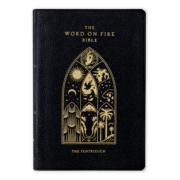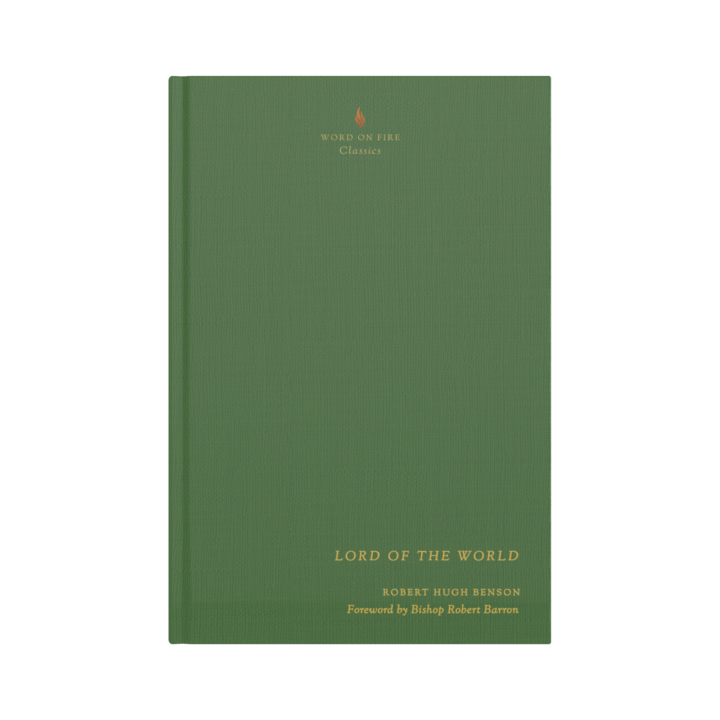
What promises peace and progress in reality brings only destruction and despair, and only one opponent can stand in the face of such evil: the Catholic Church.
The following is an excerpt from Chapter IV of Book 1: The Advent in The Lord of the World by Robert Hugh Benson. Written in 1907, it delivers a stark warning of the dangers of secular humanism. Benson chronicles the rise of the Antichrist in a dystopian future, where God has been abandoned and humanity itself has become the object of worship.
On the same afternoon Percy received a visitor.
There was nothing exceptional about him; and Percy, as he came downstairs in his walking-dress and looked at him in the light from the tall parlour-window, came to no conclusion at all as to his business and person, except that he was not a Catholic.
“You wished to see me,” said the priest, indicating a chair. “I fear I must not stop long.”
“I shall not keep you long,” said the stranger eagerly. “My business is done in five minutes.”
Percy waited with his eyes cast down.
“A—a certain person has sent me to you. She was a Catholic once; she wishes to return to the Church.”
Percy made a little movement with his head. It was a message he did not very often receive in these days.
“You will come, sir, will you not? You will promise me?”
The man seemed greatly agitated; his sallow face showed a little shining with sweat, and his eyes were piteous.
“Of course I will come,” said Percy, smiling.
“Yes, sir; but you do not know who she is. It—it would make a great stir, sir, if it was known. It must not be known, sir; you will promise me that, too?”
“I must not make any promise of that kind,” said the priest gently. “I do not know the circumstances yet.”
The stranger licked his lips nervously.
“Well, sir,” he said hastily, “you will say nothing till you have seen her? You can promise me that.”
“Oh! certainly,” said the priest.
“Well, sir, you had better not know my name. It—it may make it easier for you and for me. And—and, if you please, sir, the lady is ill; you must come to-day, if you please, but not until the evening. Will twenty-two o’clock be convenient, sir?”
“Where is it?” asked Percy abruptly.
“It—it is near Croydon junction. I will write down the address presently. And you will not come until twenty-two o’clock, sir?”
“Why not now?”

“Because the—the others may be there. They will be away then; I know that.”
This was rather suspicious, Percy thought: discreditable plots had been known before. But he could not refuse outright.
“Why does she not send for her parish-priest?” he asked.
“She—she does not know who he is, sir; she saw you once in the Cathedral, sir, and asked you for your name. Do you remember, sir?—an old lady?”
Percy did dimly remember something of the kind a month or two before; but he could not be certain, and said so.
“Well, sir, you will come, will you not?”
“I must communicate with Father Dolan,” said the priest. “If he gives me permission—”
“If you please, sir, Father—Father Dolan must not know her name. You will not tell him?”
“I do not know it myself yet,” said the priest, smiling.
The stranger sat back abruptly at that, and his face worked.
“Well, sir, let me tell you this first. This old lady’s son is my employer, and a very prominent Communist. She lives with him and his wife. The other two will be away to-night. That is why I am asking you all this. And now, you will come, sir?”
Percy looked at him steadily for a moment or two. Certainly, if this was a conspiracy, the conspirators were feeble folk. Then he answered:
“I will come, sir; I promise. Now the name.”
The stranger again licked his lips nervously, and glanced timidly from side to side. Then he seemed to gather his resolution; he leaned forward and whispered sharply.
“The old lady’s name is Brand, sir—the mother of Mr. Oliver Brand.”
For a moment Percy was bewildered. It was too extraordinary to be true. He knew Mr. Oliver Brand’s name only too well; it was he who, by God’s permission, was doing more in England at this moment against the Catholic cause than any other man alive; and it was he whom the Trafalgar Square incident had raised into such eminent popularity. And now, here was his mother—
He turned fiercely upon the man.
“I do not know what you are, sir—whether you believe in God or not; but will you swear to me on your religion and your honour that all this is true?”
The timid eyes met his, and wavered; but it was the wavering of weakness, not of treachery.
“I—I swear it, sir; by God Almighty.”
“Are you a Catholic?”
The man shook his head.
“But I believe in God,” he said. “At least, I think so.”
Percy leaned back, trying to realise exactly what it all meant. There was no triumph in his mind—that kind of emotion was not his weakness; there was fear of a kind, excitement, bewilderment, and under all a satisfaction that God’s grace was so sovereign. If it could reach this woman, who could be too far removed for it to take effect? Presently he noticed the other looking at him anxiously.
“You are afraid, sir? You are not going back from your promise?”
That dispersed the cloud a little, and Percy smiled.
“Oh! no,” he said. “I will be there at twenty-two o’clock. . . . Is death imminent?”
“No, sir; it is syncope. She is recovered a little this morning.”
The priest passed his hand over his eyes and stood up.
“Well, I will be there,” he said. “Shall you be there, sir?”

The other shook his head, standing up too.
“I must be with Mr. Brand, sir; there is to be a meeting to-night; but I must not speak of that. . . . No, sir; ask for Mrs. Brand, and say that she is expecting you. They will take you upstairs at once.”
“I must not say I am a priest, I suppose?”
“No, sir; if you please.”
He drew out a pocket-book, scribbled in it a moment, tore out the sheet, and handed it to the priest.
“The address, sir. Will you kindly destroy that when you have copied it? I—I do not wish to lose my place, sir, if it can be helped.”
Percy stood twisting the paper in his fingers a moment.
“Why are you not a Catholic yourself?” he asked.
The man shook his head mutely. Then he took up his hat, and went towards the door.
Percy passed a very emotional afternoon.
For the last month or two little had happened to encourage him. He had been obliged to report half-a-dozen more significant secessions, and hardly a conversion of any kind. There was no doubt at all that the tide was setting steadily against the Church. The mad act in Trafalgar Square, too, had done incalculable harm last week: men were saying more than ever, and the papers storming, that the Church’s reliance on the supernatural was belied by every one of her public acts. “Scratch a Catholic and find an assassin” had been the text of a leading article in the New People, and Percy himself was dismayed at the folly of the attempt. It was true that the Archbishop had formally repudiated both the act and the motive from the Cathedral pulpit, but that too had only served as an opportunity hastily taken up by the principal papers, to recall the continual policy of the Church to avail herself of violence while she repudiated the violent. The horrible death of the man had in no way appeased popular indignation; there were not even wanting suggestions that the man had been seen coming out of Archbishop’s House an hour before the attempt at assassination had taken place.
And now here, with dramatic swiftness, had come a message that the hero’s own mother desired reconciliation with the Church that had attempted to murder her son.
Continue reading the story of Percy Franklin, one of the few Catholic priests left, as he finds himself putting everything on the line for the faith that has become a crime punishable by death.
You can get your own copy of Robert Hugh Benson’s The Lord of the World here in the Word on Fire Bookstore.

